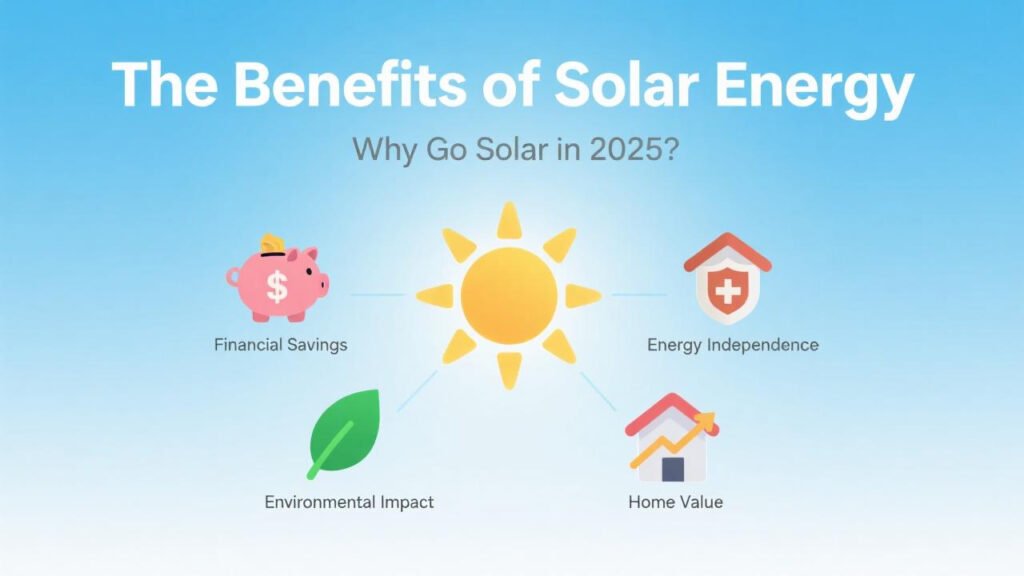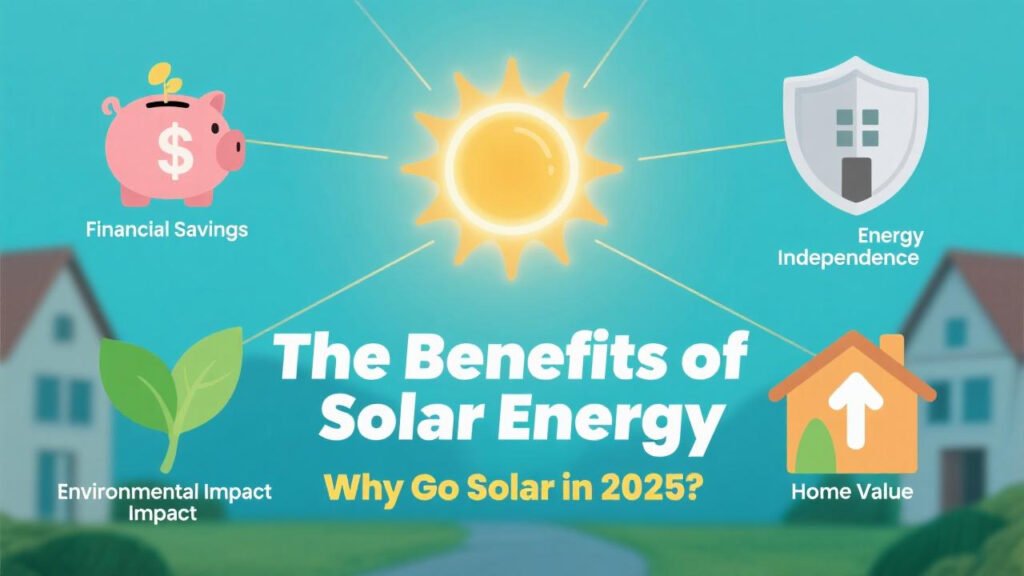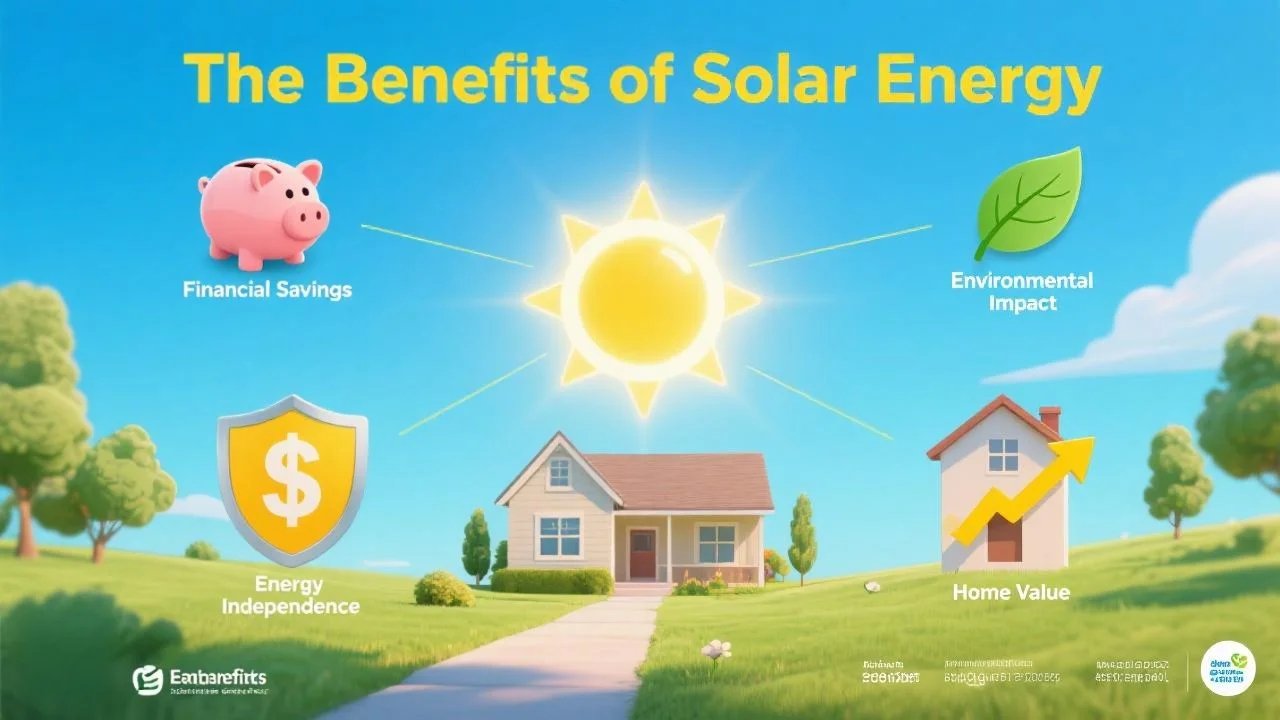Introduction: More Than Just Panels on a Roof
The sight of solar panels adorning rooftops is becoming increasingly common, and for good reason. As we move further into 2025, the case for transitioning to solar energy is more compelling than ever. Beyond the visible technology, going solar offers a multitude of benefits that extend from your personal finances to the health of our planet. If you’re a homeowner contemplating this significant home upgrade, understanding the full spectrum of advantages can solidify your decision. This guide explores the key benefits of solar energy and why 2025 is an opportune time to make the switch, especially with resources like EnergySage simplifying the journey.
1. Significant Savings on Your Electricity Bills
One of the most immediate and tangible benefits of installing solar panels is the reduction in your monthly electricity costs.
- Reduced Reliance on Utility Power: Solar panels generate your own electricity from sunlight, directly offsetting the amount of power you need to purchase from your utility company. During daylight hours, your home can run primarily on the solar energy produced.
- Net Metering Credits: In many areas, net metering policies allow you to send any excess solar electricity your system generates back to the utility grid. In return, you receive credits on your bill, which can offset the cost of electricity you draw from the grid at night or during cloudy periods. This “virtual storage” maximizes the value of your solar production.
- Protection Against Rising Utility Rates: Electricity prices from traditional utility companies have historically risen over time and can be volatile. By generating your own solar power, you gain a degree of insulation against these unpredictable rate hikes, leading to more stable and predictable energy expenses over the 25-30+ year lifespan of your solar system.
Homeowners using platforms like EnergySage often report significant savings, partly due to the ability to compare competitive quotes and secure the best pricing for their installation.
2. Attractive Financial Returns and Incentives
Solar energy is not just an expense; it’s an investment that can offer attractive financial returns.
- Federal Solar Tax Credit: The Residential Clean Energy Credit, often called the Investment Tax Credit (ITC), allows homeowners to deduct 30% of the total cost of their solar panel system (including installation and battery storage) from their federal taxes. This significantly reduces the net cost of going solar. For systems installed between 2022 and 2032, this 30% credit is a powerful incentive.
- State and Local Incentives: Many states, counties, and even local utility companies offer additional rebates, tax credits, or performance-based incentives (like Solar Renewable Energy Credits – SRECs) that can further lower the cost and improve the ROI of your solar system. The DSIRE database is an excellent resource for finding these.
- Increased Home Value: Studies have consistently shown that homes with owned solar panel systems sell for a premium and often sell faster than comparable homes without solar. Buyers appreciate the prospect of lower electricity bills.
- Payback Period and ROI: While it varies based on system cost, energy usage, and local incentives, many solar systems have a payback period of 7-10 years. After this period, the electricity generated is essentially free. The average solar power ROI is around 10%.

EnergySage provides tools and resources, including a solar calculator, to help you estimate your potential savings and ROI based on your specific location and energy needs.
3. Environmental Stewardship and Reduced Carbon Footprint
Choosing solar energy is a powerful way to contribute to a healthier planet.
- Clean, Renewable Energy: Solar power is a 100% clean, renewable energy source. Unlike fossil fuels, generating electricity from solar panels produces no greenhouse gas emissions, air pollutants, or water pollution.
- Combating Climate Change: By reducing your reliance on fossil fuel-generated electricity, you directly decrease your household’s carbon footprint. Power plants are a major source of carbon dioxide emissions, a primary driver of climate change.
- Preserving Natural Resources: Solar energy harnesses the abundant power of the sun, reducing the need to extract and burn finite resources like coal, oil, and natural gas.
The NREL Solar Futures Study envisions solar power playing a massive role in decarbonizing the U.S. electricity supply, potentially powering 40% or more of demand by 2035. Your individual system contributes to this larger goal.
4. Energy Independence and Grid Resilience
Solar energy offers a degree of energy independence and can enhance your home’s resilience.
- Reduced Dependence on the Grid: Generating your own electricity makes you less reliant on the centralized utility grid and its associated vulnerabilities, such as price fluctuations and widespread outages.
- Backup Power with Battery Storage: When you pair your solar panel system with a home battery (like a Tesla Powerwall or Enphase IQ Battery ), you can store excess solar energy for use during power outages. This provides peace of mind and ensures your essential appliances keep running even when the grid is down.
- Supporting a More Stable Grid: Distributed solar generation can help reduce strain on the electricity grid, especially during peak demand periods, contributing to overall grid stability.
5. Supporting a Growing Green Economy
Investing in solar supports a rapidly expanding industry that creates local jobs.
- Job Creation: The solar industry employs hundreds of thousands of Americans in manufacturing, installation, sales, and maintenance. Your decision to go solar contributes to this economic growth.
- Technological Innovation: Continued demand for solar drives innovation in panel efficiency, battery storage, and smart grid technologies.

Why 2025 is a Great Time to Go Solar
Several factors make 2025 a particularly advantageous year to invest in solar:
- Strong Federal Incentives: The 30% federal tax credit is fully available through 2032, offering substantial savings.
- Technological Advancements: Solar panel efficiency continues to improve, and battery storage solutions are becoming more sophisticated and affordable.
- Increased Market Competition: The growth of the solar market means more installers and financing options, leading to competitive pricing. Platforms like EnergySage allow you to easily compare these options.
- Growing Environmental Awareness: As concerns about climate change intensify, more homeowners are seeking sustainable solutions.
A Brighter Future Powered by the Sun
The benefits of solar energy in 2025 are clear and compelling. From significant financial savings and attractive investment returns to profound environmental contributions and enhanced energy independence, going solar is a multifaceted win. While the initial investment is a consideration, the long-term advantages make it a wise choice for many homeowners.
Navigating the process of going solar—from understanding your options to choosing an installer and securing financing—can be simplified with the right resources. EnergySage offers a transparent, unbiased platform where you can learn about solar, compare multiple quotes from vetted local installers, and get expert advice every step of the way, ensuring you maximize these benefits. Take the step towards a brighter, cleaner, and more affordable energy future.



